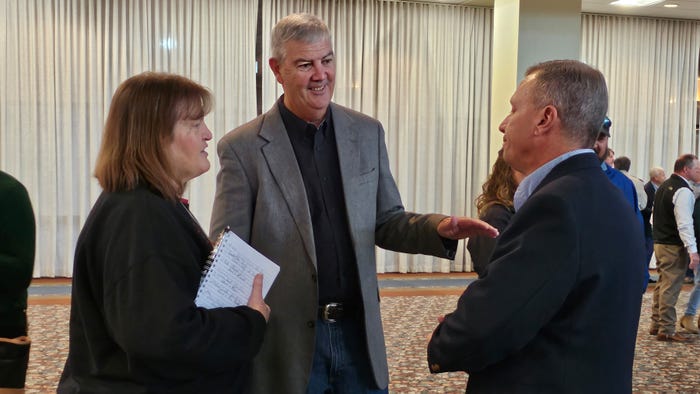
Joe Outlaw is working on his eighth farm bill. The bill remains unfinished, but he hopes producers will have a new one in 2024. Until that happens, he advises growers to make the most of the current safety net.
“We’re going to get a farm bill eventually,” says Outlaw, Texas A&M University Agriculture and Food Policy Center co-director, at the recent Texas Plant Protection Conference in Bryan.
Outlaw admits the political climate in Washington D.C. is “unbelievably messy,” but he says writing a new farm bill, “has always been messy, but they always get it done.”

Joe Outlaw, Texas A&M University Agriculture and Food Policy Center co-director, center, visits with Texas A&M AgriLife Communications Manager Kay Ledbetter, left, and Blair Fannin, communications and media relations manager at the Amarillo Farm & Ranch Show. (Photo by Shelley E. Huguley)
He’s not worried about things in Washington D.C. Instead, he and others remain focused on keeping producers in business. “Sometimes pure politics gets in the way. It’s disheartening. But you have to remember, it’s not about anything other than protecting producers. That’s the real story.”
A signed farm bill in 2023 is not likely, he says. But 2024 offers a small window of opportunity. “We have about two months before the primaries start. Once those guys have to run for their livelihood, they’re going to stop worrying about helping farmers in the farm bill.”
Raising reference prices is a sticking point. Reference prices have not changed since 2014. Not every farm organization has an increase as their priority, Outlaw says. “I know what costs they use to set those numbers, so they have to go up. Protection has to go up because costs have gone up,” he says. “Reference prices need to be raised for the safety net to be meaningful.”
Risk management with current safety net
Rather than worry, Outlaw told Farm Press at the recent 2023 Wheat Symposium in Amarillo, that producers need to be asking themselves, “What do we need to do to use the current safety net the best way we can to get the most protection?
“Depending on the situation, I’ve suggested people in this state to withdraw from Title I protection. Don’t sign up for it this year and then purchase STAX insurance, specifically cotton. Title I had no chance of triggering and more income could be protected with STAX.”
He sees a bigger picture. “Given where prices are for the crops you’re going to grow, how do we use a lot more ingenuity to make the safety net better? What do you need to do that will protect you the most from losses? Depending upon prices, crop insurance programs will cover producers better than Title I. If prices decline substantially or a new farm bill is finished, then Title I programs will provide relatively more protection.”
He also encouraged producers not to assume that their Senate or House representatives know what they’re thinking. “It’s important to reach out and express how important the safety net is. We have too many people sitting back saying, ‘I’ve had a good couple of years. The prices were good, and we got some extra money, first from President Trump and now President Biden.’
“No. Bad times are coming. We’ve got to keep pushing lawmakers to make sure they understand that they need to get this done, with higher reference prices, as soon as they can.”
New bill possibilities
When a new farm bill does pass, Outlaw anticipates “some” reference price increases. He’s less than confident of a base update. “Somebody has to be the champion of this and right now, no one appears to be the champion of increasing base acres.
“There’s very likely to be some crop insurance changes that encourage area policies. Just don’t hold your breath.”
About the Author(s)
You May Also Like






